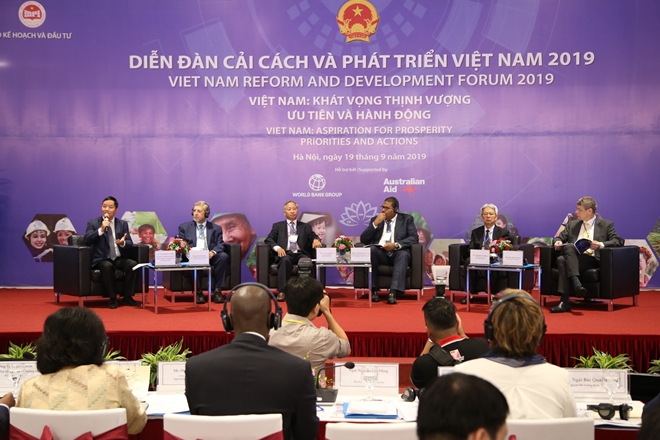Vietnam has much to do to realise aspiration for prosperity: experts
 |
| At the event. |
There would be no success if no effort is made to renovate the mindset, actively build economic development methods, and reform mechanisms and policies, said Minister of Planning and Investment Nguyen Chi Dung.
Addressing the opening ceremony of the Vietnam Reform and Development Forum (VRDF) 2019 under the theme “Vietnam: Aspiration for prosperity – Priorities and Actions” in Hanoi on September 19, Dung said that while realizing the aspiration for prosperity, overcoming the “middle income trap” alone is a considerable challenge for many developing countries, including Vietnam.He noted that in line with the economic development trend of the global economy, Vietnam has renovated the economy and applied achievements of the Forth Industrial Revolution in various areas.
In 2019, the country leaped three positions in the Global Innovation Index (GII) from 2018 to rank 42 out of 129 countries, first among 26 countries with low middle income and third among ASEAN countries after Singapore and Malaysia, Dung said.
According to the minister, in the 2011-2018 period, Vietnam recorded an annual average gross domestic product (GDP) growth rate of over 6.2 percent. By the end of 2018, Vietnam’s GDP scale valued at over 250 billion USD, with per capita GDP reaching 2,600 USD.
Vietnam has become an attractive destination for foreign investors, with investment in the 2011-2018 period hitting more than 200 billion USD, he said.
However, Dung pointed out that the Vietnamese economy’s labor productivity and competitiveness remain low.
The minister said that in order to realize the aspiration for prosperity, Vietnam has built a draft strategy on socio-economic development for the 2021-2030 period which emphasizes the need to complete the process of turning the economy into a market economy with modern orientations and integration in line with international practice, while perfecting the legal framework for new business forms and digital economy.
Meanwhile, World Bank Country Director in Vietnam Ousmane Dione said that escalating trade tensions and technological changes are affecting Vietnam, adding that the country’s economic model of the country is also facing domestic challenges, including the aging population degradation in natural resources, modest human resources and risk of reduced productivity.He stressed that breakthrough innovation is necessary for the country to grasp opportunities and mange risks in the future, adding that a well-designed socio-economic development strategy is also significant for Vietnam.
Sharing Malaysia’s experience to escape the middle income trap, K. Yogeesvara, former Deputy Minister of Plantation Industries and Commodities of Malaysia, said that during the period to rise into a high-income country, Malaysia faced challenges in the gap among regions in terms of income and quality of human resources.
He held that adequate investment in human resources development and the people will help get rid of the trap, along with balancing development among production and service sectors, and coping with rich-poor inequality.
Cao Viet Sinh, a senior economist, held that market economy mechanism has been incomprehensive and failed to meet requirements to promote the modern and integrated market economy.
David Dollar, a senior expert from the US-based Brookings Institute, held that the private sector of Vietnam has become backward due to weak access to credit and land. Vietnam should clarify areas for the State-owned sector and those for the private sector, thus creating a fair playground for both sides, he added.
Participants at the event recommended that Vietnam should make the domestic private sector the backbone of the economy, while optimizing renewable energy resources and targeting green production.
The country should focus on improving productivity, developing technology and artificial intelligence application, reforming the economic structure and completing the State system organization, they suggested.
